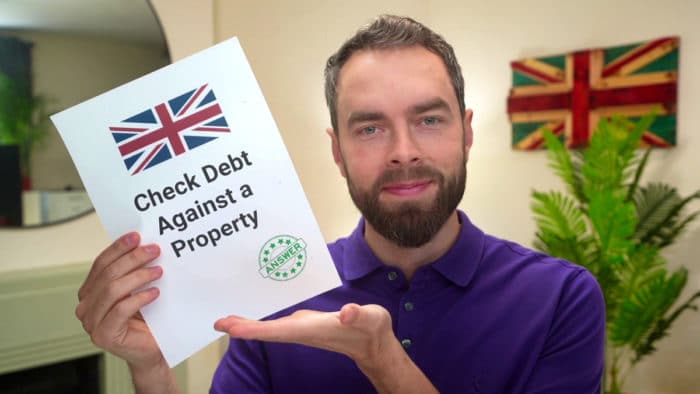Check Debt Against a Property
For free & impartial money advice you can visit MoneyHelper. We work with The Debt Advice Service who provide information about your options. This isn’t a full fact-find, some debt solutions may not be suitable in all circumstances, ongoing fees might apply & your credit rating may be affected.

For free & impartial money advice you can visit MoneyHelper. We work with The Debt Advice Service who provide information about your options. This isn’t a full fact-find, some debt solutions may not be suitable in all circumstances, ongoing fees might apply & your credit rating may be affected.
Are you planning to buy a property but worried about Charging Orders? You’re in the right place for answers. Every month, more than 170,000 people visit our website for advice on debt matters.
In this article, we’ll guide you on:
- How to check debt against a property.
- Understanding when a debt can be secured against your property.
- Knowing the effects of a Charging Order on your home and credit rating.
- Finding out if you can write off some debt.
- Learning about Charging Orders on jointly owned properties and how an IVA can stop a Charging Order.
Our team understands your concerns, as some of us have also faced similar situations. We know how it feels, and we are here to help.
Let’s dive in and learn more about how to navigate Charging Orders when buying a property.
How to Check Debt Against a Property
It’s worth noting that Land Registry Title Deeds are legal documents. They prove ownership of properties together with any charges or restriction on a property.
Land Registry charging order check
» TAKE ACTION NOW: Fill out the short debt form
When Can a Debt Be Secured Against Your Property?
Charging Order Before October 1, 2012
Charging Order After October 1, 2012
How a debt solution could help
Some debt solutions can:
- Stop nasty calls from creditors
- Freeze interest and charges
- Reduce your monthly payments
A few debt solutions can even result in writing off some of your debt.
Here’s an example:
Situation
| Monthly income | £2,504 |
| Monthly expenses | £2,345 |
| Total debt | £32,049 |
Monthly debt repayments
| Before | £587 |
| After | £158 |
£429 reduction in monthly payments
If you want to learn what debt solutions are available to you, click the button below to get started.
Will You Lose Your Home If You Get a Charging Order?
If you’re unsure what to do, I suggest you contact a debt advisor sooner rather than later.
Understanding court orders and the consequences of them being issued is paramount to a successful outcome.
Can an IVA stop a Charging Order?
A Charging Order can’t be included in an IVA.
Nor can an IVA overturn it, but it could prevent future Charging Orders being raised against you by creditors.
That said, a Charging Order turns an unsecured debt to a secured debt. So if a Charging Order is awarded prior to an IVA, the IVA can’t overturn the Charging Order.
Thousands have already tackled their debt
Every day our partners, The Debt Advice Service, help people find out whether they can lower their repayments and finally tackle or write off some of their debt.

Natasha
I’d recommend this firm to anyone struggling with debt – my mind has been put to rest, all is getting sorted.
Reviews shown are for The Debt Advice Service.
Can a Jointly Owned Property Have a Charging Order?
Glossary of terms
Charging Order – A charging order secures a debt against your property. So if you remortgage or sell your home before you settle the debt, you pay the charging order from the proceeds.
Order of Sale – An Order for sale enforces a Charging Order.
CCJ – A County Court Judgement is an order to pay a debt you owe someone/business.
IVA – An Individual Voluntary Arrangement is a legally binding agreement between a debtor and creditors.
Secured vs unsecured debt – secured debt is backed by collateral. An unsecured debt does not require collateral and therefore creditors can’t take assets if a person defaults on payments.


